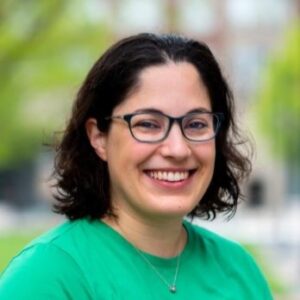By Melody Joy Kramer, NC Local News Workshop Helen Hub project manager
I’m a librarian and journalist, and I’ve long been interested in how and where people get information from non-traditional news sources, whether that’s a Discord server or a Facebook page or a Google Doc collecting and synthesizing information.
In the days after Hurricane Helene hit Western North Carolina, we saw a number of examples of these information resources appear outside of traditional newsroom structures, from group Google Docs listing resources to Discord servers using AI tools to transcribe emergency briefings, to county-level websites adapting in real-time to the low-bandwidth needs of their constituents.
What these efforts shared in common was a quick ability to adapt to the immediate needs of their audiences, and people – often strangers – developing systems to scale and moderate a community. Among them were efforts like:
- The text-only website that Buncombe County launched, in collaboration with colleagues across the state in New Hanover County.
- The Facebook page of NC State meteorology student Ethan Clark, whose forecasting and community updates informed hundreds of thousands of people across the state.
- The /r/asheville Reddit community, which collected and shared resources together as a community.
- A number of Discord servers and Google Docs run by both locals and former locals which collected, vetted, and shared information in a streamlined way.
Last week, the NC Local News Workshop invited several of these groups into a collective debrief. We wanted to understand the highlights and pain points of creating these resources, and how journalists could better support their efforts. We also wanted to hold space and time for those of us who have been deep in the trenches over the past few weeks to collectively process what had taken place. Many of us – in newsrooms, collaborative environments, and online spaces – had been working around the clock.
The session operated under Chatham House rules which meant we could share freely, but could not attribute information to any participant without asking first. As we started the session, participants expressed that they were feeling both hopeful and tired, and grateful for the community building that had taken place through these efforts.
Much of what we heard during our hour together echoed what I’ve heard from newsrooms during breaking news events: It’s challenging to vet information and explain what’s happening in real time as events rapidly change. Moderation is hard. It’s important to develop roles and teams so that people can work quickly and understand who can be trusted.

We also learned that groups had quickly developed onboarding resources to help new people start to make contributions, and that they integrated accessibility into their products from the start – the Discord used AI to describe images posted during Buncombe’s daily press briefings, to help visually-impaired users. AshevilleRelief.org, which started as a Google Doc and eventually developed a more robust backend due to traffic, provided offline access for people who might have had wi-fi access sporadically and need information later on.
We talked about ways in which journalists could embed or work more closely with community-driven content. We also tested this. For several weeks, I’ve sat inside two Discord chat spaces to act as a conduit between the NC journalism community and the community-built resources. I helped where I could, pointed people to resources, but also brought ideas and questions back to the NC Local News Workshop space to see where overlaps existed.
We talked about how it might be possible for journalists to create channels or be badged within these spaces, and ways to fact-check in real time. We talked about print products, and things like thumb drives to share information with communities with sporadic or non-existent Internet service.
There’s much to learn from groups who quickly put together information for communities and there are many overlaps between what newsrooms provided in the aftermath of the hurricane and these spaces. Perhaps the most significant moment for me was when someone on the call started to cry and another participant – a trauma-informed counselor – asked us to all hold space and not rush the moment. It was something I’ve never seen at a journalism conference, but was so very much needed. It felt like a safe space to learn and process and share.
What happens next? We invited members of the shared resources into our Slack, so that cross-pollination can occur. We want to hold future debriefs about tooling, and one specifically with PIOs from counties across the state, who turned to Facebook in the earliest days after the hurricane to share information.
These are models that are emerging, and more learning can and should occur. I’m grateful for everyone who came together to share, and I look forward to working alongside them in the weeks to come.
If you’d like to learn more about this work, please reach out to Melody at melody@nclocal.org.


